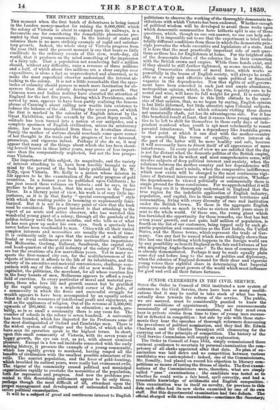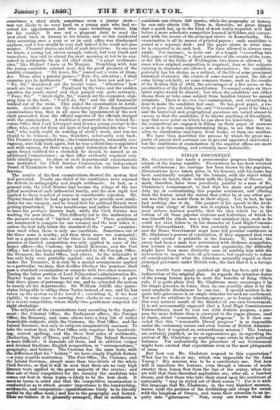JUNIOR CLERKSHIPS IN THE CIVIL SERVICE.
SINCE the Order in Council of 1855 instituted a new system of entrance to the Civil Service, there have been so many modifi- cations that it may be useful to take stock of what has been actually done towards the reform of the service. The public, we are assured, must be considerably puzzled to know the present conditions of appointment. They see announcements occasionally of competitive examination, and they must even hear in private circles from time to time of young men success- ful or defeated in competition : but side by side with these state- ments they hear the speeches of thorough reformers denouncing the prevalence of political nomination, and they find Mr. Edwin Chadwick and Sir Charles Trevelyan still clamouring for the carrying out of the principle of competition. The history of the Civil Service Commission will supply an explanation. The Order in Council of June 1855, simply commissioned three eminent gentlemen to ascertain by personal examination the com- petency of all clerks appointed after that date. No plan of ex- amination was laid down and no competition between various candidates was contemplated ; indeed, one of the Commissioners, Mr. Romilly, had placed on record his objection to literary com- petitions as means of testing the 'fitness of clerks. The first exami- natinns of the Commissioners were, therefore, what are simply called " pass " examinations ; the candidate was tested as to whether he could write a fair hand, spell correctly, and had a reasonable knowledge of arithmetic and English composition. This examination was in itself no novelty, for previous to this date each office had its new clerks examined by one of its own staff. But this departmental examination had two defects. The official charged with the examination—sometimes the Secretary, sometimes a chief clerk, sometimes even a junior clerk— was not likely to be very hard on a young man who had re- ceived his appointment and who came trembling before him for his veract. It was not a pleasant duty to send the new clerk back in dismay to his family, and so this incidental duty occurring once a year or so in each office was discharged anyhow, and a boy should be very dull indeed if he could not pass muster. Pleasant stories are told of such interviews. In one case we know, a young lad, clever enough, indeed, but very timid and tremulous, was told to attend the next morning at ten to be exa- mined in arithmetic by an old chief clerk, "a great fuithmeti-. cian," like Michael Cassie or De Morgan. Trembling with fear the young candidate entered next day the gruff presence of the terrible examiner. "Sit down, Sir," roared out a voice of thun-
der. Then, after a s inful pause—" Now, Sir, attention ; I shall examine you in Ant' etic." "Shall I not have pen and pa—" "No, Sir," thundered out the tyrant voice. "Attention ! how much are two and two ?" Paralysed by the voice and the sudden question the youth stared and then gasped out, quite seriously, " Four, Sir." "Quite right, Sir," roared out the examiner, slap- ping him on the back, "You'll do, Sir," and the old humourist walked out of the room. This ended the examination in Arith- metic. Another cause for the deficiency of these departmental examinations was, that in all cases the appointment of the new clerk proceeded from the official superior of the officials charged with the examination. A tradition is preserved in the Inland Re- venue Office that Lord Liverpool sent down a young protege to the office, who, even for these old days of bad appointments was "too bad, who really could do nothing of clerk's work, and was too stupid to be trained ; he was, therefore, reluctantly sent back. The Premier reappointed him ; the Commissioners, unusually cou- rageous, sent him back again, but he was a third time reappointed and with success, for there was a quiet intimation that if he was again found unfitted for a clerkship he should be named as an additional Commissioner • as that office evidently required very little intelligence. In place of such departmental examinations was instituted the Civil Service Commission, an independent Board of Examiners to test each clerk on his entrance into the Service.
The results of the first examinations showed the system -that had prevailed. Nearly one-third of the candidates were rejected for defects in orthography and simple arithmetic. In fact, as a general rule the Civil Service had become the refuge of the less gifted members of each influential family, and the new rigid test applied to these resulted of course in considerable rejection. Mr. Hayter found that he had again and again to provide new candi- dates for one vacaucy, and he found that his political friends were getting dissatisfied. It was troublesome and rather discreditable to have his proteges thrown back, while the Civil Service was waiting for new clerks. This difficulty led to the institution of the present system of "limited competition." Three gentlemen are nominated to compete for one vacancy and the best takes it; unless the best falls below the standard of the "pass" examina- tion used when there is only one candidate. Sometimes out of the three none is worthy, and then three more are nominated ; but as a general rule one of the three is found fit. At first, this practice of limited competition was only applied to some of the larger offices—the Customs, the Inland Revenue, and the Post Office ; but it has been gradually extended to the Foreign Office, the Treasury, the Audit Office, and others. In the Admiralty it has only been very partially applied ; and in all the offices not under the Treasury, it is only by a special arrangement applied to a particular vacancy, that decides whether the nominee shall pass a standard examination or compete with two other nominees. During the latter portion of Lord Palmerston's administration Mr. liayter began to see the beauty of these competitions ; it gave him three pieces of patronage for one, and he extended the system to nearly all his departments. Sir William Jolliffe also appre- ciates being able to oblige three Tories instead of one, and he has taken up the system as if he loved it ; extending it, if we hear rightly, in some cases to naming four clerks to one vacancy—as in a recent competition, where thirty-two gentlemen -competed for eight clerkships.
The subjects of the examinations vary according to the depart- ment ; the Colonial Office, the Parliament offices, the Foreign Office, the Treasury, and some others have a lone. list of rather formidable subjects, while the Customs, the PoseOffice, and the Inland Revenue' test only in subjects -comparatively common. To take the easiest first, the Post Office only requires fair handwrit- ing, correct spelling, and the three first rules of arithmetic, (Reduction, Rule of Three, and Practice.) The Inland Revenue is more difficult; it demands all these, and in addition vulgar and decimal fractions, English composition, or "correspondence," geography, and 'history. The Customs has the same tests, with the difference that for " history " we have simply English history —a very sensible restriction. The Post Office, the Customs, and the Inland Revenue, absorb more than two-thirds of the whole Civil Service' so that it will be seen that there are no very high literary tests applied to the great majority of the service ; and that out of three competitors for the vacancy the candidate who comes out best in these topics is likely to be the best clerk. It must be borne in mind also that the competitive examination is conducted so as to attach greater importance to the handwriting, arithmetic, and composition—(qualifications likely to be directly useful in the office work,) and less to the geography and history. Thus we believe it is generally arranged, that in arithmetic a candidate can obtain 350 marks, while for geography or history he can only obtain 150. There is, therefore, no great danger that a quick lad, up to the kind of work really required, will fnjj before a more scholastic competitor learned in Gibbon and conver- sant with the course of the principal rivers in Karaschatka. The examination is all by means of printed papers ; each candidate is seated at a separate desk ; and the paper states in what time he is expected to do each task. The time allowed is always very ample. For instance, to write out, at a length "exceeding two folio pages of writing," a short narrative of the events of the year, or the life of the Duke of Wellington, two hours is allowed. In cases where original composition is required, four or five subjects varying in character are allowed as alternatives ; the candidate generally has his choice, as a subject, of the life of some prominent historical character, the events of some recent period, the life of some living celebrity, or some common theme, such as the results of the Reform Bill of 1832, the advantages of a free press, or the peculiarities of the British constitution. To compel essays on these latter topics would be absurd ; but when the candidate can either choose them or take some subject from familiar history he cannot complain. There is no viva voce examination, and everything is done to make the candidate feel easy. He has good paper, a va- riety of pens (he can bring his own "favourite" pens if he likes ) and the historical and geographical questions are varied almost likes,) excess so that the candidate, if he knows anything of the subject, may find some point on which he can show his knowledge. While the competitors are engaged in filling up their paper of answers a clerk is in the room superintending them to see that they re- ceive no clandestine assistance from books, or from one another.
We have thus described the process by which the great ma- jority of junior civil servants are at present appointed arid tested ; but the conditions of examination in the superior offices are more various and interesting, and certainly more debateable.







































 Previous page
Previous page